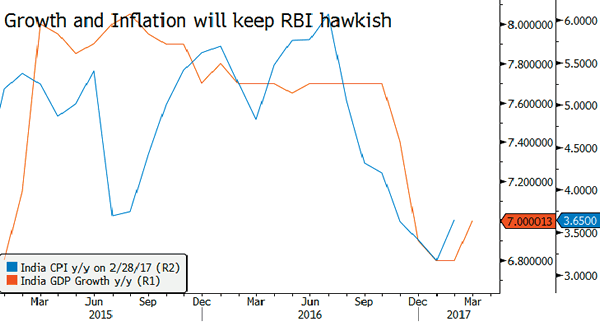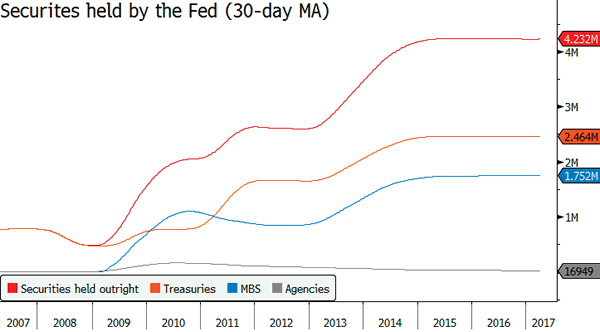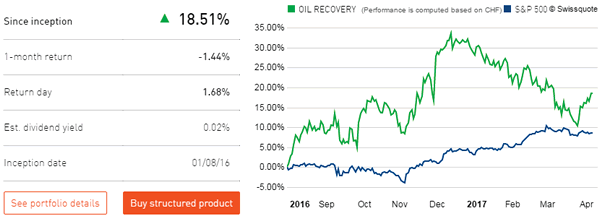- Buy EM Specifically INR – Peter Rosenstreich
- Fed Plans To Unwind Its Balance Sheet – Arnaud Masset
- French Election: Mélenchon Risk To Single Currency Is Underestimated – Yann Quelenn
- Oil Recovery
FX Markets – Buy EM Specifically INR
Emerging market currency had an extremely busy week, while G10 markets were in wait-and-see mood. Political uncertainty in South Africa spiked driving ZAR weakness. The much anticipated, but marginally earlier then suggested, EURCZK floor was removed. While US missile strikes on Assad regime highlighted increased tension between the US and Russia causing RUB to fall 1.0% overnight. Yet, despite the idiosyncratic risk of each currency we remain bullish on the asset class and view pullbacks as opportunity to reload EM longs. The external environment remains supportive as globally, activity indicators show stronger economic performance and commodities (oil) prices inched higher. Specifically we remain bullish on INR for two key reasons. First is the hawkish monetary policy meeting and secondly, the resiliency of the INR to external geopolitical events.
The Reserve Bank of India (RBI) held the benchmark policy repo rate unchanged at 6.25% but raised the reverse repo rate by 25bp to 6% (narrowing policy rate corridor). Despite that fact that adjustment of the repo rate is slightly more operational, the move does have hawkish overtones above neutral policy stance. But, the RBI’s upwards revision in the inflation projection by 25bp to 4.75% for 2017-2018 was a clearly hawkish signal. Annual growth is projected at 7.4%, for 2017 and the RBI sees improvement in advanced economies as supporting further economic acceleration. We suspect the probability of the RBI cutting rates this year is significantly low consider the growing inflation pressure (despite inflation falling to 3.4% well below 5% target level) and health growth backdrop.
While there is a lack of core drivers, non-market related events continue to inject short term volatility.
Mounting expectations for Trump tax reform, French presidential elections and contentious Brexit negotiations suggest that hype will cloud real fundamentals. Yet so far the INR has proved surprising resilience to external events. While investor quickly rotated to safe-haven FX trades (JPY, USD and gold) on the news of US military aggression, INR appreciations continued un-interrupted. In the last 3-months INR has gained 5.80% against the USD at a time when US treasury rates were on a rollercoaster ride. Indian economy has become a magnet for capital inflows which could force that RBI to attempt to limited INR strength. But current RBI FX interventions have been limited indicating comfort with INR levels. If nothing else investors can enjoy a high carry with INR.

Economics – Fed Plans To Unwind Its Balance Sheet
Given the lacklustre pace of recovery of the US economy, most participants expected the Fed to stick to its initial plan: gradual rate tightening. Instead, the minutes of the March FOMC meeting revealed that the members discussed extensively the strategy to start unloading the $4.5 trillion of bonds and mortgage-backed securities that currently sit on its balance. Technically, the Fed did not actually discuss selling those assets but rather changing the committee’s reinvestment policy later this year. Indeed, the central bank is currently reinvesting all principal payments from its Treasury, agency debt and agency MBS portfolios, which has the effect to maintain unchanged the nominal size of its portfolio.
Until now, Fed members were only vaguely discussing about unwinding its bonds portfolio. In addition, the balance sheet discussions only recently started to gain traction. The market did not expect the Fed to move that fast as most analyst were expecting the Fed would start finetuning its reinvestment policy in the middle of 2018. This surprise move caught investors off guard and forced them to reassess the US economic outlook as well as the effect on the USD. Indeed, choosing to unload the balance sheet instead of tightening short-term rate has the advantage to limit, to some extent, USD appreciation.
At present, it is difficult to know what the real effects of unwinding the balance sheet are going to be. In such a situation, the market’s response was rather muted, translating perfectly the fact that we are entering new territory. In addition, the reflation trade in the US is, more than ever, being questioned by market participants as President Trump’s administration has been unable to carry out any of its planned reforms so far. Moreover, the unpredictability of Trump’s foreign policy will also keep investors on the back foot, which would eventually prevent the USD to appreciate significantly.
Nevertheless, the backdrop of political uncertainty in the European Union favours the greenback in the short-term, especially against the euro and the pound sterling. Indeed, the sharp increase in implied volatility – 25 delta risk-reversal slid to -3.51% on Friday – suggests that the market is becoming increasingly worried about French election. Due to its safe haven status, the Japanese yen remains the best candidate for upside surprise against the USD.

Economics – Mélenchon Risk To Single Currency Is Underestimated
The second debate of the French Presidential Election was broadcast earlier last week, during which the 11 candidates had the chance to expose their views on many different topics. Emmanuel Macron, who is leading the polls for the final win, was hardly attacked by the other candidates. No candidate performed badly and so it was very hard to find a winner.
There are only two weeks remaining until the first round of the French Election. We know that whatever may happen in those last few weeks, declarations from candidates may still have an impact on the markets. Francois Fillon has not renounced, despite being considered out of the race in February, and we may see him increasing again in polls. His chance of a final victory is still alive.
Regarding Emmanuel Macron, many socialists are now supporting him. What should we believe from that? We believe that their endorsement is less in a desire to counter the National Front, but rather to participate in the likely new presidential majority.
A few weeks ahead of the first round on April 23rd, there is some disappointing data on the French industrial side. February’s industrial production declined by -1.6% m/m, well below the market’s consensus at -0.3%. On an annualized basis, the decline is around -0.7%. Manufacturing production also declined strongly in February to -0.6% y/y. This is the worst contraction for French industry since September.
In the markets, we can see the CAC 40 is improving more slowly than the Euro Stoxx 50. We try to measure investors’ fear and we believe banks’ stocks price are a good proxy for that. It is clear that their volatility is increasing.
The end of the Hollande mandate is rather difficult and the new President will definitely have a hard time pushing the French economy. This very weak data illustrates why there has been a boost towards more sovereignty over the last few years and the rise of the nationalism.
Currency-wise, we do not see the euro improving should Macron or Francois Fillon get elected. There is also a growing risk for the monetary union as we believe Jean-Luc Mélenchon’s chance of winning is underestimated. His performances in those kind of debates are always one of the most accomplished, if not the best. And his "Plan B" is that in the case of negotiation failure, he would not hesitate to ask for a Frexit referendum. So we now assume that Euro downside risks are not anymore only due to Marine Le Pen.
The markets are still betting on a Macron victory but we assume his inexperience is going to be tough to overcome against his major competitors. The markets seem calm and the first round is going to provide us with a decent gauge. For now, markets are still not pricing a Le Pen victory. In terms of currency, the Euro is consolidating against the USD between 1.06 and 1.07 and we believe that there is more room for further downside in the short-term.
Themes Trading – Oil Recovery
Cuts in crude oil production and growing demand indicate that crude prices should continue to grind higher in 2017. In an unexpected move, OPEC silenced skeptics by orchestrating the first production cut in eight years between OPEC and non-OPEC countries. The agreement sent crude prices soaring. After four years of depressed crude prices as a result of a global supply glut, the group’s three largest producers – Saudi Arabia, Iraq and Iran – overcame significant disagreement to move to reduce global oil inventories. The agreement was unprecedented, with Russia and Mexico also joining in to cut output.
As oil market dynamics continued to tighten, certain companies are better positioned to take advantage of improving oil prices. This Oil Recovery theme is designed to exploit rising prices by selecting companies mostly active in the upstream segment, which would benefit the most from a barrel above $60. To enhance risk diversification, the portfolio is structured using an equally-weighted risk contribution approach. In summary, this means the allocation is calculated in such a way that each stock contributes on an equal basis to the portfolio’s total risk. This approach allows for lower volatility and, in so doing, increases the risk/ reward ratio.

